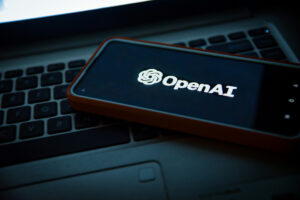OpenAI: Developing a New Work "Buddy"? Reading the Future of Productivity Tools
Hello everyone, I'm Tak@, a System Integrator. In my free time, I enjoy developing web services using generative AI.
Our way of working is currently undergoing a massive transformation.
At the heart of this change is the evolution of generative AI. What's particularly noteworthy is how OpenAI's ChatGPT, long familiar as a chatbot, is poised to transform significantly into a business productivity tool.
This signals the beginning of a new era of competition for services we use daily, like Google Workspace and Microsoft 365. Today, let's dive deep into how this fascinating development might impact our work.
OpenAI's New Challenge: ChatGPT as a Productivity Powerhouse?
Reports indicate that OpenAI is developing a new AI-driven productivity suite, potentially putting ChatGPT in direct competition with existing business productivity tools like Google Workspace and Microsoft Office 365.
This move could genuinely revolutionize how we work.
Up until now, ChatGPT has been widely known as an advanced conversational assistant and content generation tool. However, OpenAI isn't just looking to create text; they aim to evolve ChatGPT into a foundational productivity platform for work.
According to leaked information, OpenAI is developing a suite of collaborative tools that would allow users to create, edit, and manage documents in real-time with AI assistance.
If this comes to fruition, it would be the first serious challenge to the dominance Google Docs and Microsoft Office have established in the cloud-based productivity tool market.
This suggests that ChatGPT has the potential to move beyond being just a chatbot and become a central fixture in daily business operations.
Challenging the Giants: Competition with Google and Microsoft
This new direction from OpenAI will intensify the direct competition with Google Workspace and Microsoft 365, the two dominant players already controlling the market. Both companies are already integrating their own generative AI assistants into their platforms, fueling an intense AI technology race.
For instance, Google has integrated its AI technology, Gemini, across Google Workspace.
This integration provides AI assistance within tools like Gmail, Docs, Sheets, Slides, and Meet. A key feature of Gemini is its particular focus on automated code generation.
Meanwhile, Microsoft has integrated Copilot into its Microsoft 365 tools, making it available in applications like Word, Excel, Outlook, and Teams.
Copilot not only generates code but also offers coding hints and suggestions.
Both tools leverage AI to streamline daily tasks such as drafting and organizing emails, preparing for meetings, and analyzing data in spreadsheets.
OpenAI is attempting to carve out a unique position by offering an "AI-first experience," designing its platform with AI at its core, rather than simply "bolting on" AI to existing tools.
Agile product development is also a strength.
This fierce competition motivates each company to develop more advanced and user-friendly AI tools, which is expected to result in more choices and better services for us, the users.
OpenAI's Vision for an "AI Work Hub"
The new features OpenAI is reportedly developing aim to meet a wide range of corporate needs. This goes beyond simple text generation, striving to facilitate smoother team collaboration with AI assistance and enhance overall operational efficiency.
Real-time Collaborative Editing
Rumor has it that a feature enabling multiple people to work on the same document simultaneously, seeing each other's edits in real time, will be included. This aims to provide a collaborative environment, similar to what's expected from Google Docs or Microsoft Word Online, but with the added power of AI.
AI might directly offer suggestions within the editing screen for refining expressions, improving document structure, and even analyzing data.
From my own experience, collaborative work with various departments, such as developing release plans, is essential in system development. I'm very excited to see how much smoother these tasks will become with AI's involvement.
This feature holds the potential to significantly boost the efficiency of collaborative work.
Integrated Chat Functionality
Users may soon be able to comment on documents and chat directly within the platform. This would enable in-context discussions, brainstorming, and quick confirmations without ever leaving the ChatGPT environment.
Reports also suggest that meeting transcription features will be included. This will foster a closer link between work and communication, driving more efficient task execution.
AI-powered Document Management
Imagine an AI assistant automatically helping you summarize documents, extract key points, and maintain consistent formatting. This would reduce the manual effort involved in management, making information organization and utilization much easier.
We might see a future where AI automatically condenses complex reports. This holds immense potential for significantly improving information management and utilization.
Future Email and Calendar Integration
Future integrations with Gmail, Google Calendar, and Microsoft Outlook are also rumored. This could allow users to manage emails, schedule meetings, and set reminders directly within ChatGPT.
The goal is to reduce the time spent jumping between multiple applications, allowing users to complete a variety of tasks in a single place.
For example, Microsoft's Copilot already has the ability to summarize messages in both Outlook and Teams. This will be a crucial step for ChatGPT to truly become an "AI Work Hub."
Complex Relationship: OpenAI and Microsoft's Alliance and Competition
OpenAI's entry into the productivity tool market could create subtle tension with Microsoft, its largest investor and close collaborator.
Microsoft has provided much of the funding necessary for OpenAI's advanced AI model development and has secured the right to integrate OpenAI's technology into its own products, particularly "Microsoft Copilot."
In fact, Microsoft reportedly holds approximately 49% of OpenAI's for-profit arm, and the two companies are currently negotiating a restructuring of OpenAI's for-profit business. Meanwhile, OpenAI has shown signs of reducing its reliance on Microsoft's cloud services, with reports also indicating a strategic alliance with Google, a rival in the AI field.
This situation highlights a complex interplay of technological cooperation and business competition, posing significant questions about the future relationship between the two companies.
Challenges OpenAI Must Overcome
For OpenAI to succeed with this new productivity suite, it must overcome several critical challenges. Enterprise users, in particular, will demand extremely high levels of security, privacy, and compliance with legal requirements, especially concerning the handling of confidential data.
Data Security and Privacy
Business users will require strong assurances that their confidential documents and communications are thoroughly protected. Strict adherence to data protection regulations like GDPR and clear policies for enterprise customers are essential.
Generative AI technology is still evolving, and concerns have been raised about the generation of inaccurate information, potential infringements on copyright and privacy rights, and the risk of data leaks.
Therefore, human verification of final information remains crucial. From my own experience in financial system development, I deeply understood the importance of security through PKI (Public Key Infrastructure). To gain trust in the enterprise market, security and privacy will be the most vital keys.
Integration with Existing Tools
For widespread corporate adoption, ChatGPT's new suite must seamlessly connect with existing business software (such as CRM systems, ERP systems, and file storage).
It needs to integrate naturally into established corporate workflows, rather than merely functioning as an isolated workspace.
Google Workspace and Microsoft 365 have achieved high levels of integration within their respective ecosystems. OpenAI's success will hinge on its ability to flexibly adapt to diverse corporate environments.
Speed to Market
Google and Microsoft are already actively enhancing their AI capabilities. To avoid falling behind the competition, OpenAI needs to rapidly launch a minimum viable product (MVP) that can compete in the market.
Currently, there are no official announcements or specific release dates, and it's merely rumored that a beta version might be available in the latter half of this year. Rapid development and market deployment are crucial for gaining a competitive edge.
The Future of Work Transformed by AI
The changes generative AI is bringing to our "work" are truly decisive. Like Microsoft 365 Copilot, AI is acting as a "co-pilot for work," assisting our daily tasks, boosting productivity, and even supporting creative activities.
For example, Japan Business Systems (JBS) is a case in point, having fully implemented Copilot for approximately 2,500 employees starting in March 2024, focusing on its widespread adoption.
AI can automate email drafting and summarize web conference content, thereby reducing the time previously spent on these tasks.
I myself enjoy developing AI tools in my spare time, such as the "AI Learning Planner" and the "AI Automation Proposal Service," to bring my daily "wouldn't it be nice if" ideas to life. Collaborating with AI holds the potential to make our work more efficient and creative.
Conclusion and Future Expectations
The potential for OpenAI's ChatGPT to evolve into a productivity suite comparable to Google Workspace and Microsoft 365 is a fascinating development for the future of AI and business.
This competition will motivate each company to develop more advanced and user-friendly AI tools, ultimately providing us, the users, with a richer array of optimal choices.
Google Workspace, with its inherent strengths in collaboration and ease of sharing, and Microsoft 365, offering an integrated experience, are both leveraging the power of AI to reach new heights.
As system integrators, we are feeling the wave of AI-driven transformation in work firsthand, and we intend to continue our efforts to maximize its infinite possibilities.



